Comprehensive Analysis of Social Policy in the UK: Key Issues
VerifiedAdded on 2023/04/25
|11
|4228
|52
Essay
AI Summary
This essay provides a comprehensive analysis of social policy in the UK, beginning with a definition of social policy and its evolution from early governmental interventions to modern social welfare systems. It explores the ideological underpinnings of social policies, contrasting Marxist, socialist, liberal, and Third Way perspectives, and examines how these ideologies influence policy implementation. The essay identifies key social issues in the UK, such as family structure changes, unemployment, and social inequality, and discusses how social policies aim to address these challenges. Furthermore, it highlights the impacts of these policies on various aspects of society and the challenges encountered during their implementation. The study concludes by emphasizing the continuous need for social policies to adapt to evolving societal needs and maintain a balanced social environment. Desklib offers a range of resources, including similar essays and solved assignments, for students seeking further insights into this topic.
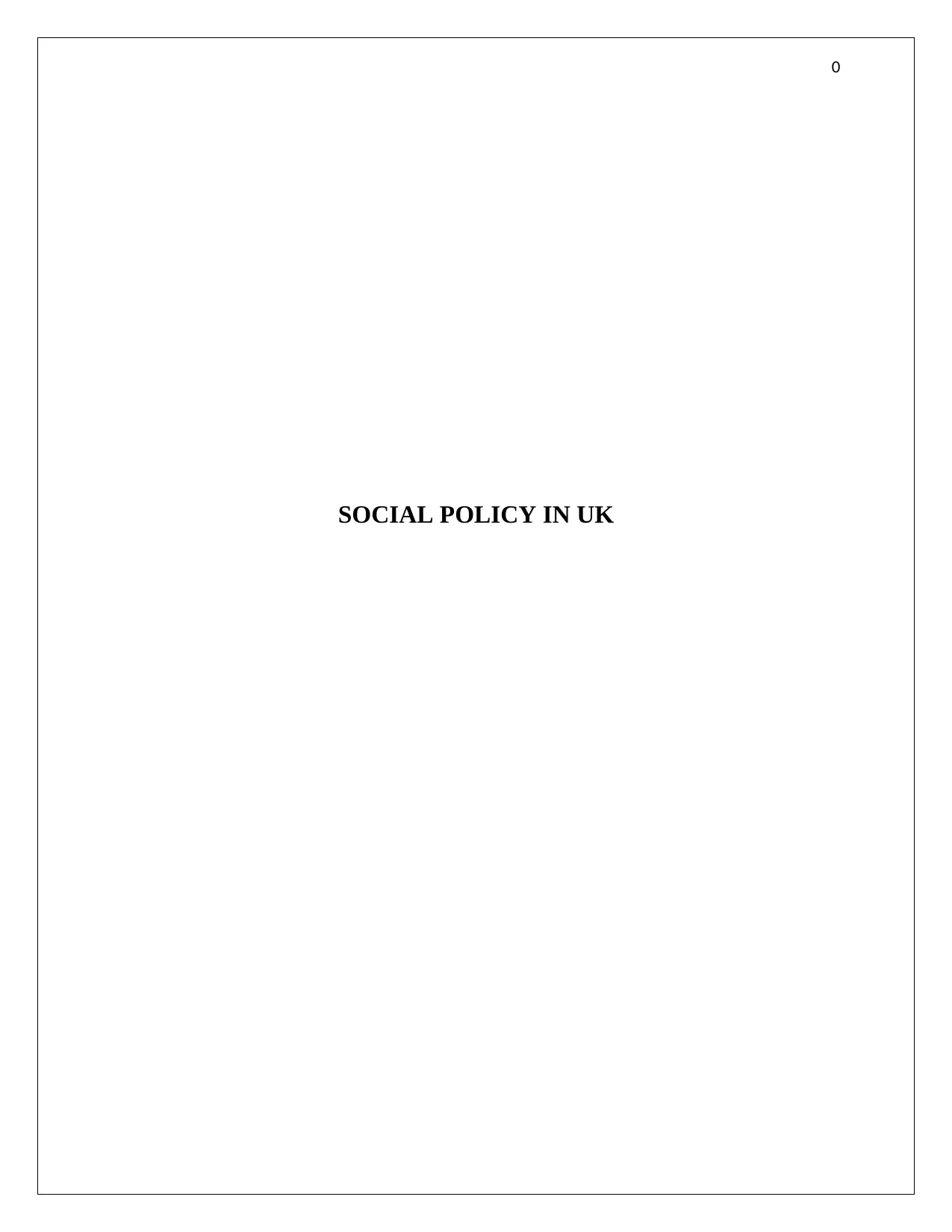
0
SOCIAL POLICY IN UK
SOCIAL POLICY IN UK
Paraphrase This Document
Need a fresh take? Get an instant paraphrase of this document with our AI Paraphraser
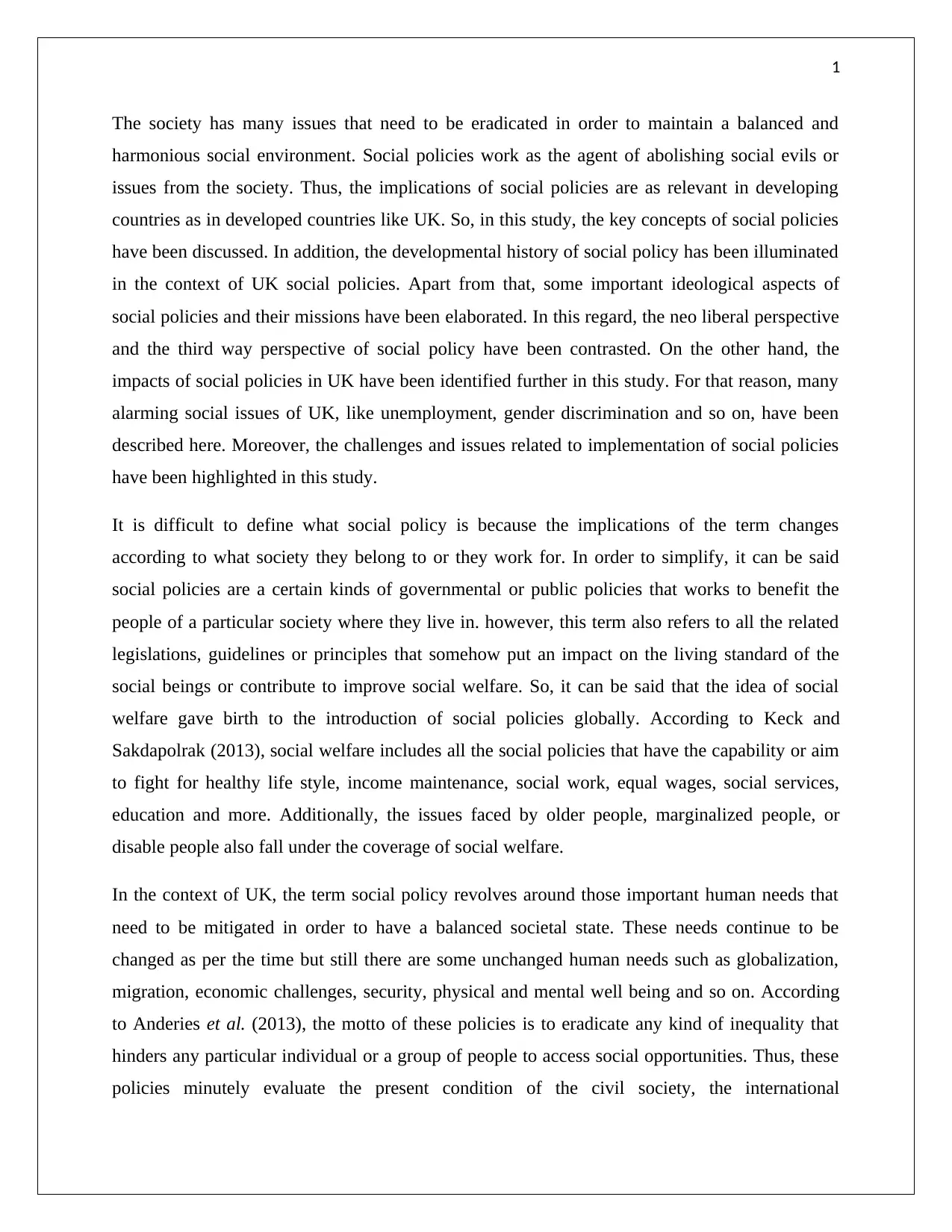
1
The society has many issues that need to be eradicated in order to maintain a balanced and
harmonious social environment. Social policies work as the agent of abolishing social evils or
issues from the society. Thus, the implications of social policies are as relevant in developing
countries as in developed countries like UK. So, in this study, the key concepts of social policies
have been discussed. In addition, the developmental history of social policy has been illuminated
in the context of UK social policies. Apart from that, some important ideological aspects of
social policies and their missions have been elaborated. In this regard, the neo liberal perspective
and the third way perspective of social policy have been contrasted. On the other hand, the
impacts of social policies in UK have been identified further in this study. For that reason, many
alarming social issues of UK, like unemployment, gender discrimination and so on, have been
described here. Moreover, the challenges and issues related to implementation of social policies
have been highlighted in this study.
It is difficult to define what social policy is because the implications of the term changes
according to what society they belong to or they work for. In order to simplify, it can be said
social policies are a certain kinds of governmental or public policies that works to benefit the
people of a particular society where they live in. however, this term also refers to all the related
legislations, guidelines or principles that somehow put an impact on the living standard of the
social beings or contribute to improve social welfare. So, it can be said that the idea of social
welfare gave birth to the introduction of social policies globally. According to Keck and
Sakdapolrak (2013), social welfare includes all the social policies that have the capability or aim
to fight for healthy life style, income maintenance, social work, equal wages, social services,
education and more. Additionally, the issues faced by older people, marginalized people, or
disable people also fall under the coverage of social welfare.
In the context of UK, the term social policy revolves around those important human needs that
need to be mitigated in order to have a balanced societal state. These needs continue to be
changed as per the time but still there are some unchanged human needs such as globalization,
migration, economic challenges, security, physical and mental well being and so on. According
to Anderies et al. (2013), the motto of these policies is to eradicate any kind of inequality that
hinders any particular individual or a group of people to access social opportunities. Thus, these
policies minutely evaluate the present condition of the civil society, the international
The society has many issues that need to be eradicated in order to maintain a balanced and
harmonious social environment. Social policies work as the agent of abolishing social evils or
issues from the society. Thus, the implications of social policies are as relevant in developing
countries as in developed countries like UK. So, in this study, the key concepts of social policies
have been discussed. In addition, the developmental history of social policy has been illuminated
in the context of UK social policies. Apart from that, some important ideological aspects of
social policies and their missions have been elaborated. In this regard, the neo liberal perspective
and the third way perspective of social policy have been contrasted. On the other hand, the
impacts of social policies in UK have been identified further in this study. For that reason, many
alarming social issues of UK, like unemployment, gender discrimination and so on, have been
described here. Moreover, the challenges and issues related to implementation of social policies
have been highlighted in this study.
It is difficult to define what social policy is because the implications of the term changes
according to what society they belong to or they work for. In order to simplify, it can be said
social policies are a certain kinds of governmental or public policies that works to benefit the
people of a particular society where they live in. however, this term also refers to all the related
legislations, guidelines or principles that somehow put an impact on the living standard of the
social beings or contribute to improve social welfare. So, it can be said that the idea of social
welfare gave birth to the introduction of social policies globally. According to Keck and
Sakdapolrak (2013), social welfare includes all the social policies that have the capability or aim
to fight for healthy life style, income maintenance, social work, equal wages, social services,
education and more. Additionally, the issues faced by older people, marginalized people, or
disable people also fall under the coverage of social welfare.
In the context of UK, the term social policy revolves around those important human needs that
need to be mitigated in order to have a balanced societal state. These needs continue to be
changed as per the time but still there are some unchanged human needs such as globalization,
migration, economic challenges, security, physical and mental well being and so on. According
to Anderies et al. (2013), the motto of these policies is to eradicate any kind of inequality that
hinders any particular individual or a group of people to access social opportunities. Thus, these
policies minutely evaluate the present condition of the civil society, the international
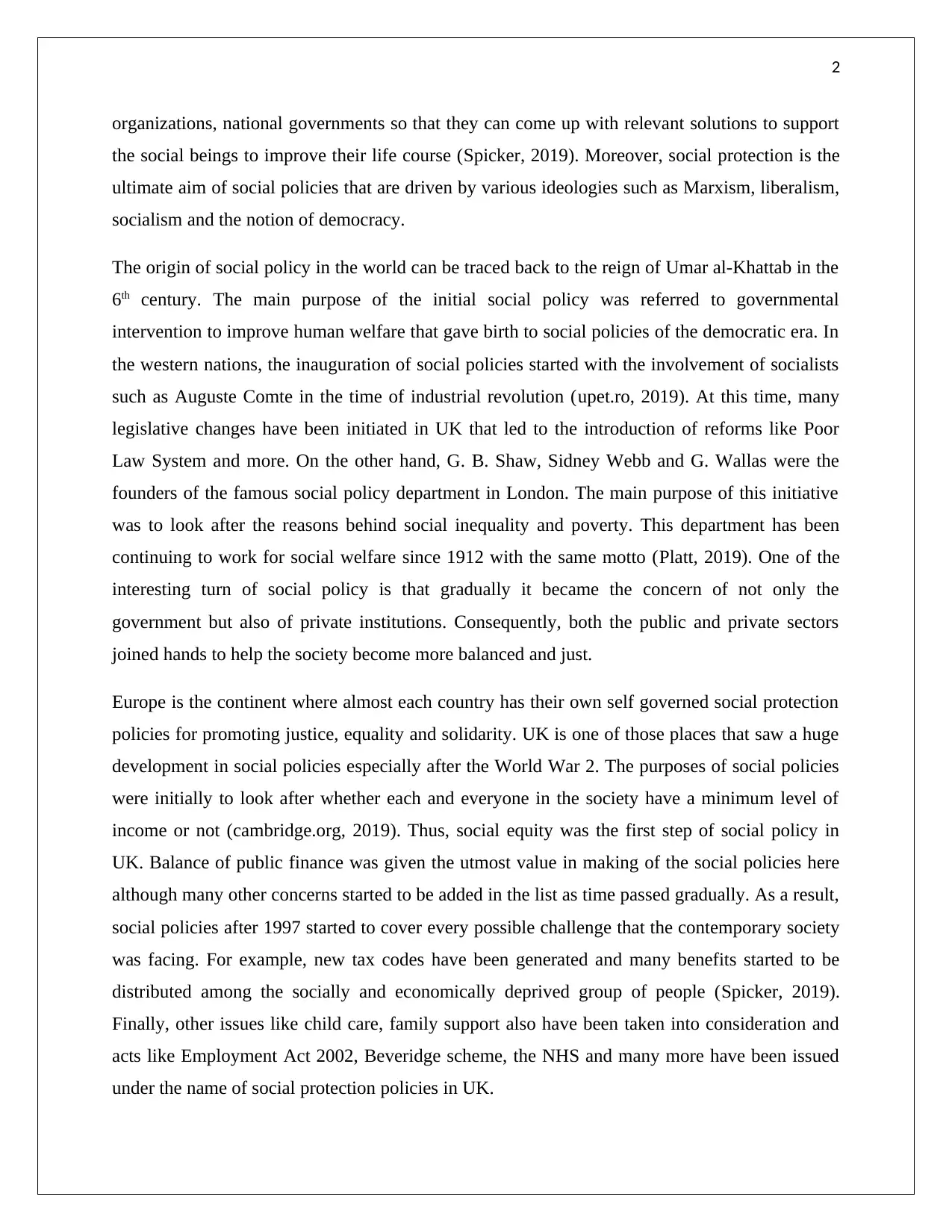
2
organizations, national governments so that they can come up with relevant solutions to support
the social beings to improve their life course (Spicker, 2019). Moreover, social protection is the
ultimate aim of social policies that are driven by various ideologies such as Marxism, liberalism,
socialism and the notion of democracy.
The origin of social policy in the world can be traced back to the reign of Umar al-Khattab in the
6th century. The main purpose of the initial social policy was referred to governmental
intervention to improve human welfare that gave birth to social policies of the democratic era. In
the western nations, the inauguration of social policies started with the involvement of socialists
such as Auguste Comte in the time of industrial revolution (upet.ro, 2019). At this time, many
legislative changes have been initiated in UK that led to the introduction of reforms like Poor
Law System and more. On the other hand, G. B. Shaw, Sidney Webb and G. Wallas were the
founders of the famous social policy department in London. The main purpose of this initiative
was to look after the reasons behind social inequality and poverty. This department has been
continuing to work for social welfare since 1912 with the same motto (Platt, 2019). One of the
interesting turn of social policy is that gradually it became the concern of not only the
government but also of private institutions. Consequently, both the public and private sectors
joined hands to help the society become more balanced and just.
Europe is the continent where almost each country has their own self governed social protection
policies for promoting justice, equality and solidarity. UK is one of those places that saw a huge
development in social policies especially after the World War 2. The purposes of social policies
were initially to look after whether each and everyone in the society have a minimum level of
income or not (cambridge.org, 2019). Thus, social equity was the first step of social policy in
UK. Balance of public finance was given the utmost value in making of the social policies here
although many other concerns started to be added in the list as time passed gradually. As a result,
social policies after 1997 started to cover every possible challenge that the contemporary society
was facing. For example, new tax codes have been generated and many benefits started to be
distributed among the socially and economically deprived group of people (Spicker, 2019).
Finally, other issues like child care, family support also have been taken into consideration and
acts like Employment Act 2002, Beveridge scheme, the NHS and many more have been issued
under the name of social protection policies in UK.
organizations, national governments so that they can come up with relevant solutions to support
the social beings to improve their life course (Spicker, 2019). Moreover, social protection is the
ultimate aim of social policies that are driven by various ideologies such as Marxism, liberalism,
socialism and the notion of democracy.
The origin of social policy in the world can be traced back to the reign of Umar al-Khattab in the
6th century. The main purpose of the initial social policy was referred to governmental
intervention to improve human welfare that gave birth to social policies of the democratic era. In
the western nations, the inauguration of social policies started with the involvement of socialists
such as Auguste Comte in the time of industrial revolution (upet.ro, 2019). At this time, many
legislative changes have been initiated in UK that led to the introduction of reforms like Poor
Law System and more. On the other hand, G. B. Shaw, Sidney Webb and G. Wallas were the
founders of the famous social policy department in London. The main purpose of this initiative
was to look after the reasons behind social inequality and poverty. This department has been
continuing to work for social welfare since 1912 with the same motto (Platt, 2019). One of the
interesting turn of social policy is that gradually it became the concern of not only the
government but also of private institutions. Consequently, both the public and private sectors
joined hands to help the society become more balanced and just.
Europe is the continent where almost each country has their own self governed social protection
policies for promoting justice, equality and solidarity. UK is one of those places that saw a huge
development in social policies especially after the World War 2. The purposes of social policies
were initially to look after whether each and everyone in the society have a minimum level of
income or not (cambridge.org, 2019). Thus, social equity was the first step of social policy in
UK. Balance of public finance was given the utmost value in making of the social policies here
although many other concerns started to be added in the list as time passed gradually. As a result,
social policies after 1997 started to cover every possible challenge that the contemporary society
was facing. For example, new tax codes have been generated and many benefits started to be
distributed among the socially and economically deprived group of people (Spicker, 2019).
Finally, other issues like child care, family support also have been taken into consideration and
acts like Employment Act 2002, Beveridge scheme, the NHS and many more have been issued
under the name of social protection policies in UK.
⊘ This is a preview!⊘
Do you want full access?
Subscribe today to unlock all pages.

Trusted by 1+ million students worldwide
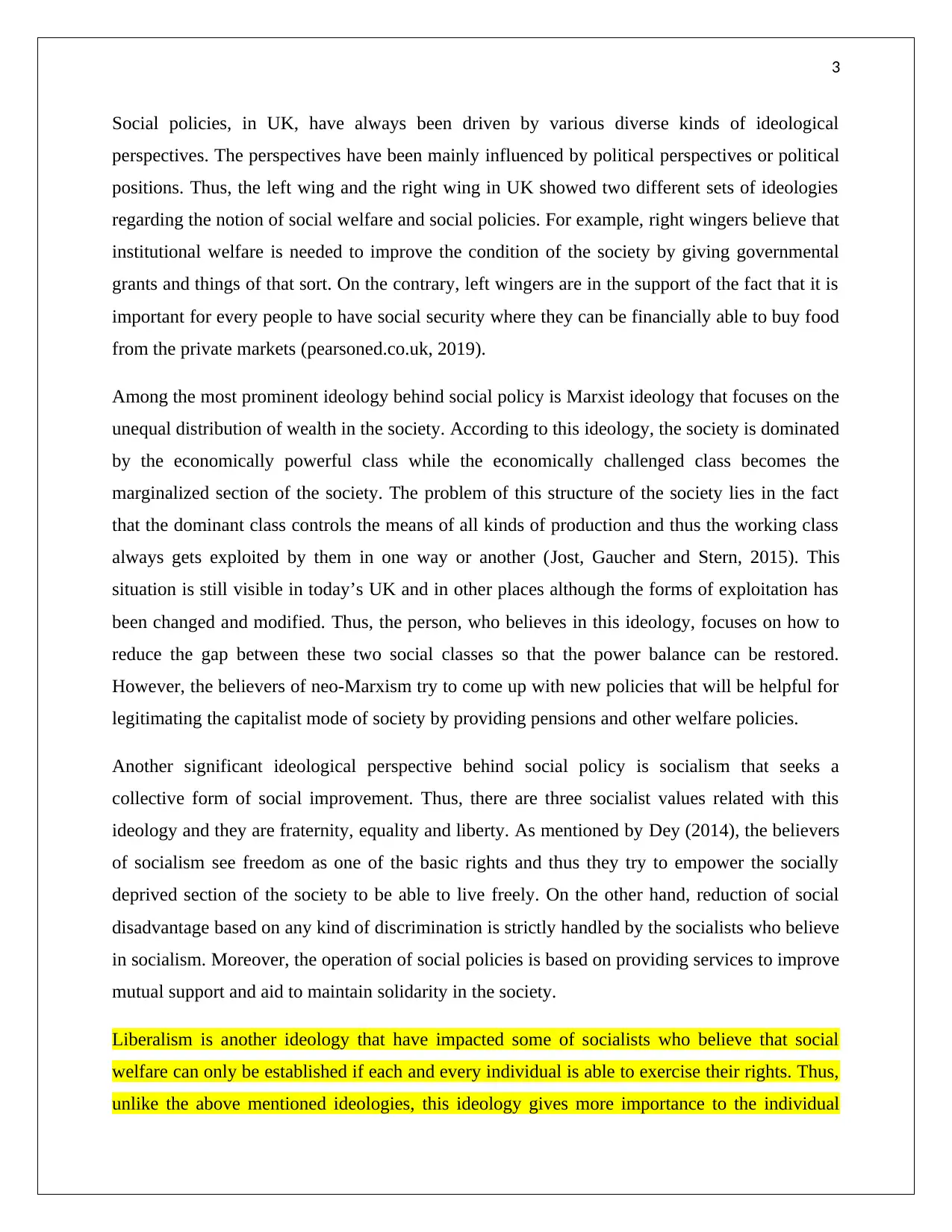
3
Social policies, in UK, have always been driven by various diverse kinds of ideological
perspectives. The perspectives have been mainly influenced by political perspectives or political
positions. Thus, the left wing and the right wing in UK showed two different sets of ideologies
regarding the notion of social welfare and social policies. For example, right wingers believe that
institutional welfare is needed to improve the condition of the society by giving governmental
grants and things of that sort. On the contrary, left wingers are in the support of the fact that it is
important for every people to have social security where they can be financially able to buy food
from the private markets (pearsoned.co.uk, 2019).
Among the most prominent ideology behind social policy is Marxist ideology that focuses on the
unequal distribution of wealth in the society. According to this ideology, the society is dominated
by the economically powerful class while the economically challenged class becomes the
marginalized section of the society. The problem of this structure of the society lies in the fact
that the dominant class controls the means of all kinds of production and thus the working class
always gets exploited by them in one way or another (Jost, Gaucher and Stern, 2015). This
situation is still visible in today’s UK and in other places although the forms of exploitation has
been changed and modified. Thus, the person, who believes in this ideology, focuses on how to
reduce the gap between these two social classes so that the power balance can be restored.
However, the believers of neo-Marxism try to come up with new policies that will be helpful for
legitimating the capitalist mode of society by providing pensions and other welfare policies.
Another significant ideological perspective behind social policy is socialism that seeks a
collective form of social improvement. Thus, there are three socialist values related with this
ideology and they are fraternity, equality and liberty. As mentioned by Dey (2014), the believers
of socialism see freedom as one of the basic rights and thus they try to empower the socially
deprived section of the society to be able to live freely. On the other hand, reduction of social
disadvantage based on any kind of discrimination is strictly handled by the socialists who believe
in socialism. Moreover, the operation of social policies is based on providing services to improve
mutual support and aid to maintain solidarity in the society.
Liberalism is another ideology that have impacted some of socialists who believe that social
welfare can only be established if each and every individual is able to exercise their rights. Thus,
unlike the above mentioned ideologies, this ideology gives more importance to the individual
Social policies, in UK, have always been driven by various diverse kinds of ideological
perspectives. The perspectives have been mainly influenced by political perspectives or political
positions. Thus, the left wing and the right wing in UK showed two different sets of ideologies
regarding the notion of social welfare and social policies. For example, right wingers believe that
institutional welfare is needed to improve the condition of the society by giving governmental
grants and things of that sort. On the contrary, left wingers are in the support of the fact that it is
important for every people to have social security where they can be financially able to buy food
from the private markets (pearsoned.co.uk, 2019).
Among the most prominent ideology behind social policy is Marxist ideology that focuses on the
unequal distribution of wealth in the society. According to this ideology, the society is dominated
by the economically powerful class while the economically challenged class becomes the
marginalized section of the society. The problem of this structure of the society lies in the fact
that the dominant class controls the means of all kinds of production and thus the working class
always gets exploited by them in one way or another (Jost, Gaucher and Stern, 2015). This
situation is still visible in today’s UK and in other places although the forms of exploitation has
been changed and modified. Thus, the person, who believes in this ideology, focuses on how to
reduce the gap between these two social classes so that the power balance can be restored.
However, the believers of neo-Marxism try to come up with new policies that will be helpful for
legitimating the capitalist mode of society by providing pensions and other welfare policies.
Another significant ideological perspective behind social policy is socialism that seeks a
collective form of social improvement. Thus, there are three socialist values related with this
ideology and they are fraternity, equality and liberty. As mentioned by Dey (2014), the believers
of socialism see freedom as one of the basic rights and thus they try to empower the socially
deprived section of the society to be able to live freely. On the other hand, reduction of social
disadvantage based on any kind of discrimination is strictly handled by the socialists who believe
in socialism. Moreover, the operation of social policies is based on providing services to improve
mutual support and aid to maintain solidarity in the society.
Liberalism is another ideology that have impacted some of socialists who believe that social
welfare can only be established if each and every individual is able to exercise their rights. Thus,
unlike the above mentioned ideologies, this ideology gives more importance to the individual
Paraphrase This Document
Need a fresh take? Get an instant paraphrase of this document with our AI Paraphraser
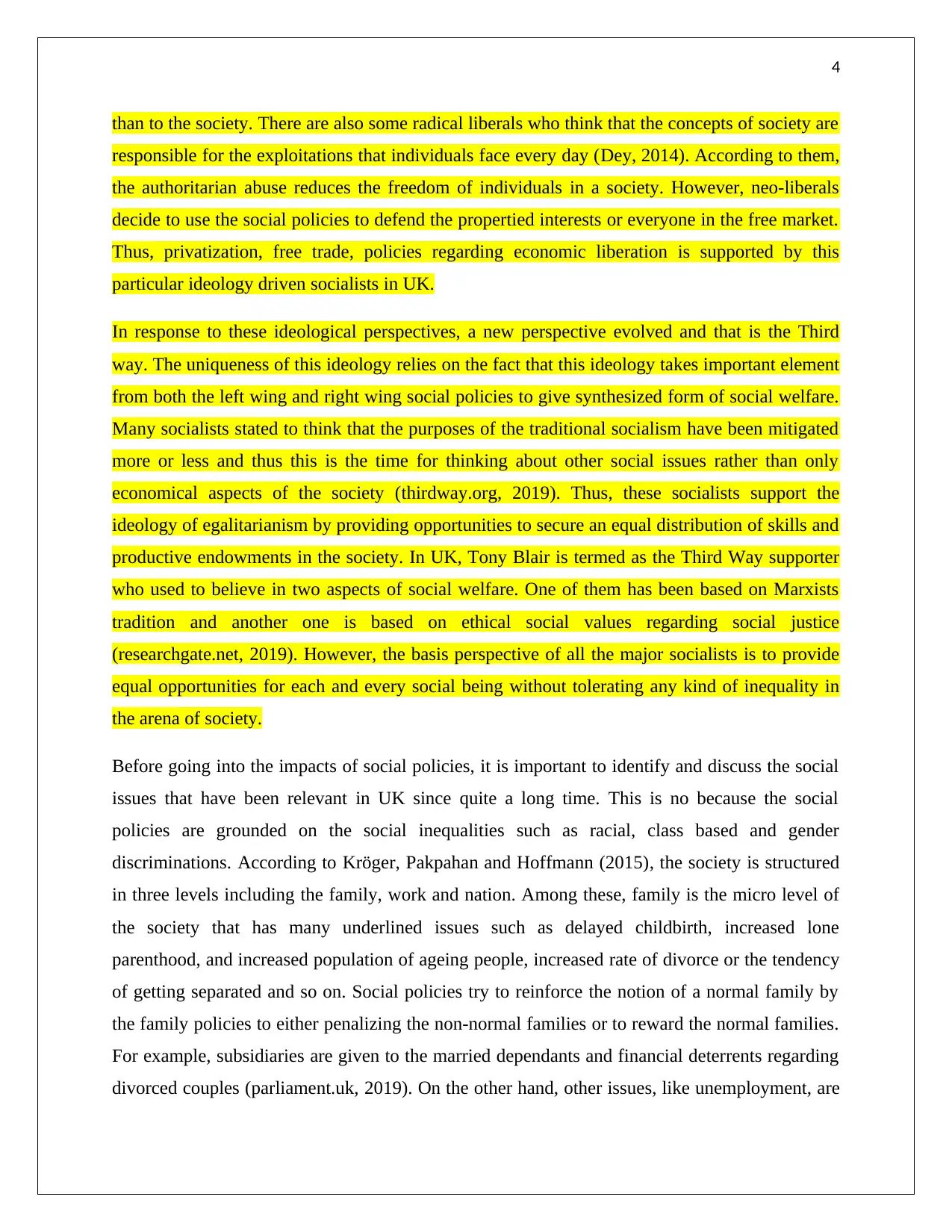
4
than to the society. There are also some radical liberals who think that the concepts of society are
responsible for the exploitations that individuals face every day (Dey, 2014). According to them,
the authoritarian abuse reduces the freedom of individuals in a society. However, neo-liberals
decide to use the social policies to defend the propertied interests or everyone in the free market.
Thus, privatization, free trade, policies regarding economic liberation is supported by this
particular ideology driven socialists in UK.
In response to these ideological perspectives, a new perspective evolved and that is the Third
way. The uniqueness of this ideology relies on the fact that this ideology takes important element
from both the left wing and right wing social policies to give synthesized form of social welfare.
Many socialists stated to think that the purposes of the traditional socialism have been mitigated
more or less and thus this is the time for thinking about other social issues rather than only
economical aspects of the society (thirdway.org, 2019). Thus, these socialists support the
ideology of egalitarianism by providing opportunities to secure an equal distribution of skills and
productive endowments in the society. In UK, Tony Blair is termed as the Third Way supporter
who used to believe in two aspects of social welfare. One of them has been based on Marxists
tradition and another one is based on ethical social values regarding social justice
(researchgate.net, 2019). However, the basis perspective of all the major socialists is to provide
equal opportunities for each and every social being without tolerating any kind of inequality in
the arena of society.
Before going into the impacts of social policies, it is important to identify and discuss the social
issues that have been relevant in UK since quite a long time. This is no because the social
policies are grounded on the social inequalities such as racial, class based and gender
discriminations. According to Kröger, Pakpahan and Hoffmann (2015), the society is structured
in three levels including the family, work and nation. Among these, family is the micro level of
the society that has many underlined issues such as delayed childbirth, increased lone
parenthood, and increased population of ageing people, increased rate of divorce or the tendency
of getting separated and so on. Social policies try to reinforce the notion of a normal family by
the family policies to either penalizing the non-normal families or to reward the normal families.
For example, subsidiaries are given to the married dependants and financial deterrents regarding
divorced couples (parliament.uk, 2019). On the other hand, other issues, like unemployment, are
than to the society. There are also some radical liberals who think that the concepts of society are
responsible for the exploitations that individuals face every day (Dey, 2014). According to them,
the authoritarian abuse reduces the freedom of individuals in a society. However, neo-liberals
decide to use the social policies to defend the propertied interests or everyone in the free market.
Thus, privatization, free trade, policies regarding economic liberation is supported by this
particular ideology driven socialists in UK.
In response to these ideological perspectives, a new perspective evolved and that is the Third
way. The uniqueness of this ideology relies on the fact that this ideology takes important element
from both the left wing and right wing social policies to give synthesized form of social welfare.
Many socialists stated to think that the purposes of the traditional socialism have been mitigated
more or less and thus this is the time for thinking about other social issues rather than only
economical aspects of the society (thirdway.org, 2019). Thus, these socialists support the
ideology of egalitarianism by providing opportunities to secure an equal distribution of skills and
productive endowments in the society. In UK, Tony Blair is termed as the Third Way supporter
who used to believe in two aspects of social welfare. One of them has been based on Marxists
tradition and another one is based on ethical social values regarding social justice
(researchgate.net, 2019). However, the basis perspective of all the major socialists is to provide
equal opportunities for each and every social being without tolerating any kind of inequality in
the arena of society.
Before going into the impacts of social policies, it is important to identify and discuss the social
issues that have been relevant in UK since quite a long time. This is no because the social
policies are grounded on the social inequalities such as racial, class based and gender
discriminations. According to Kröger, Pakpahan and Hoffmann (2015), the society is structured
in three levels including the family, work and nation. Among these, family is the micro level of
the society that has many underlined issues such as delayed childbirth, increased lone
parenthood, and increased population of ageing people, increased rate of divorce or the tendency
of getting separated and so on. Social policies try to reinforce the notion of a normal family by
the family policies to either penalizing the non-normal families or to reward the normal families.
For example, subsidiaries are given to the married dependants and financial deterrents regarding
divorced couples (parliament.uk, 2019). On the other hand, other issues, like unemployment, are
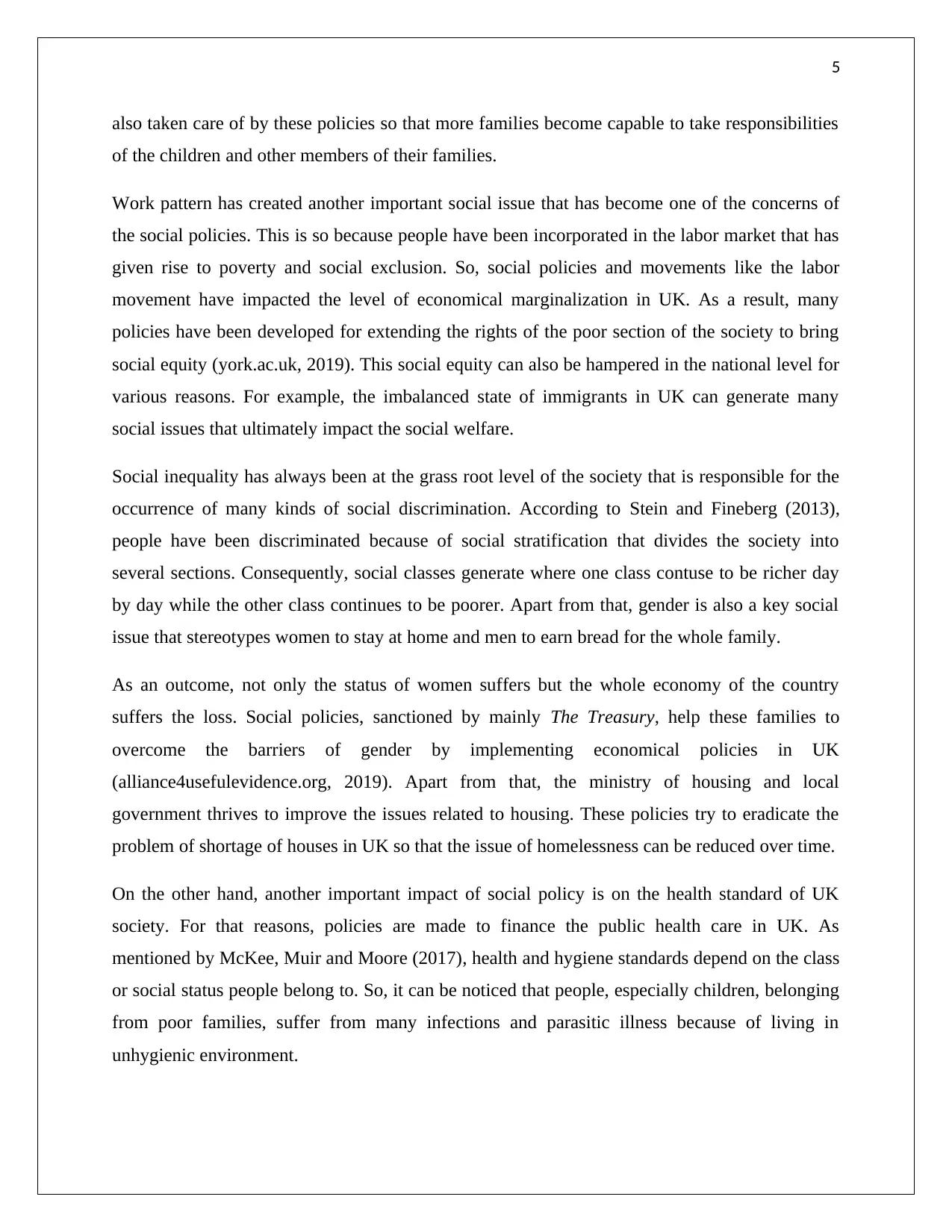
5
also taken care of by these policies so that more families become capable to take responsibilities
of the children and other members of their families.
Work pattern has created another important social issue that has become one of the concerns of
the social policies. This is so because people have been incorporated in the labor market that has
given rise to poverty and social exclusion. So, social policies and movements like the labor
movement have impacted the level of economical marginalization in UK. As a result, many
policies have been developed for extending the rights of the poor section of the society to bring
social equity (york.ac.uk, 2019). This social equity can also be hampered in the national level for
various reasons. For example, the imbalanced state of immigrants in UK can generate many
social issues that ultimately impact the social welfare.
Social inequality has always been at the grass root level of the society that is responsible for the
occurrence of many kinds of social discrimination. According to Stein and Fineberg (2013),
people have been discriminated because of social stratification that divides the society into
several sections. Consequently, social classes generate where one class contuse to be richer day
by day while the other class continues to be poorer. Apart from that, gender is also a key social
issue that stereotypes women to stay at home and men to earn bread for the whole family.
As an outcome, not only the status of women suffers but the whole economy of the country
suffers the loss. Social policies, sanctioned by mainly The Treasury, help these families to
overcome the barriers of gender by implementing economical policies in UK
(alliance4usefulevidence.org, 2019). Apart from that, the ministry of housing and local
government thrives to improve the issues related to housing. These policies try to eradicate the
problem of shortage of houses in UK so that the issue of homelessness can be reduced over time.
On the other hand, another important impact of social policy is on the health standard of UK
society. For that reasons, policies are made to finance the public health care in UK. As
mentioned by McKee, Muir and Moore (2017), health and hygiene standards depend on the class
or social status people belong to. So, it can be noticed that people, especially children, belonging
from poor families, suffer from many infections and parasitic illness because of living in
unhygienic environment.
also taken care of by these policies so that more families become capable to take responsibilities
of the children and other members of their families.
Work pattern has created another important social issue that has become one of the concerns of
the social policies. This is so because people have been incorporated in the labor market that has
given rise to poverty and social exclusion. So, social policies and movements like the labor
movement have impacted the level of economical marginalization in UK. As a result, many
policies have been developed for extending the rights of the poor section of the society to bring
social equity (york.ac.uk, 2019). This social equity can also be hampered in the national level for
various reasons. For example, the imbalanced state of immigrants in UK can generate many
social issues that ultimately impact the social welfare.
Social inequality has always been at the grass root level of the society that is responsible for the
occurrence of many kinds of social discrimination. According to Stein and Fineberg (2013),
people have been discriminated because of social stratification that divides the society into
several sections. Consequently, social classes generate where one class contuse to be richer day
by day while the other class continues to be poorer. Apart from that, gender is also a key social
issue that stereotypes women to stay at home and men to earn bread for the whole family.
As an outcome, not only the status of women suffers but the whole economy of the country
suffers the loss. Social policies, sanctioned by mainly The Treasury, help these families to
overcome the barriers of gender by implementing economical policies in UK
(alliance4usefulevidence.org, 2019). Apart from that, the ministry of housing and local
government thrives to improve the issues related to housing. These policies try to eradicate the
problem of shortage of houses in UK so that the issue of homelessness can be reduced over time.
On the other hand, another important impact of social policy is on the health standard of UK
society. For that reasons, policies are made to finance the public health care in UK. As
mentioned by McKee, Muir and Moore (2017), health and hygiene standards depend on the class
or social status people belong to. So, it can be noticed that people, especially children, belonging
from poor families, suffer from many infections and parasitic illness because of living in
unhygienic environment.
⊘ This is a preview!⊘
Do you want full access?
Subscribe today to unlock all pages.

Trusted by 1+ million students worldwide
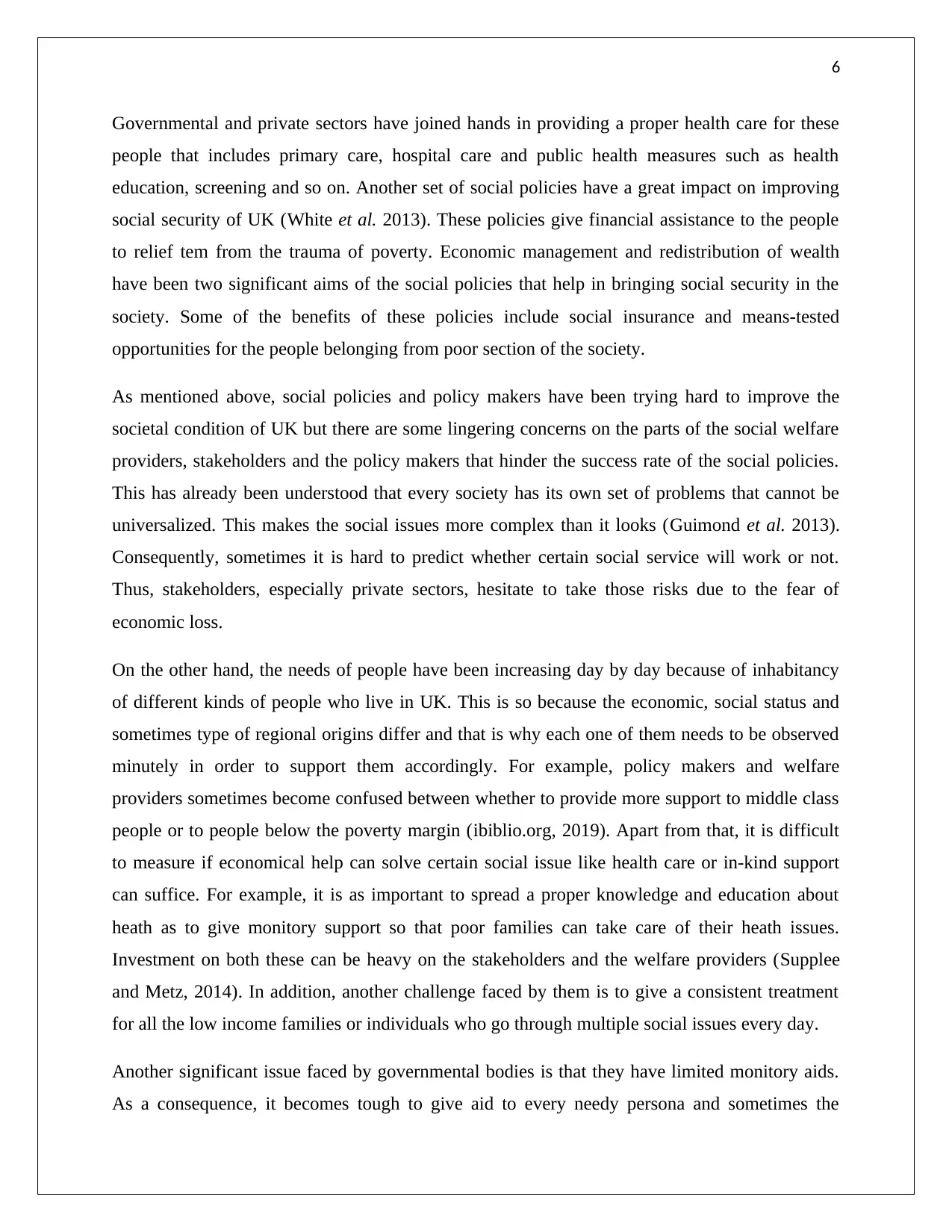
6
Governmental and private sectors have joined hands in providing a proper health care for these
people that includes primary care, hospital care and public health measures such as health
education, screening and so on. Another set of social policies have a great impact on improving
social security of UK (White et al. 2013). These policies give financial assistance to the people
to relief tem from the trauma of poverty. Economic management and redistribution of wealth
have been two significant aims of the social policies that help in bringing social security in the
society. Some of the benefits of these policies include social insurance and means-tested
opportunities for the people belonging from poor section of the society.
As mentioned above, social policies and policy makers have been trying hard to improve the
societal condition of UK but there are some lingering concerns on the parts of the social welfare
providers, stakeholders and the policy makers that hinder the success rate of the social policies.
This has already been understood that every society has its own set of problems that cannot be
universalized. This makes the social issues more complex than it looks (Guimond et al. 2013).
Consequently, sometimes it is hard to predict whether certain social service will work or not.
Thus, stakeholders, especially private sectors, hesitate to take those risks due to the fear of
economic loss.
On the other hand, the needs of people have been increasing day by day because of inhabitancy
of different kinds of people who live in UK. This is so because the economic, social status and
sometimes type of regional origins differ and that is why each one of them needs to be observed
minutely in order to support them accordingly. For example, policy makers and welfare
providers sometimes become confused between whether to provide more support to middle class
people or to people below the poverty margin (ibiblio.org, 2019). Apart from that, it is difficult
to measure if economical help can solve certain social issue like health care or in-kind support
can suffice. For example, it is as important to spread a proper knowledge and education about
heath as to give monitory support so that poor families can take care of their heath issues.
Investment on both these can be heavy on the stakeholders and the welfare providers (Supplee
and Metz, 2014). In addition, another challenge faced by them is to give a consistent treatment
for all the low income families or individuals who go through multiple social issues every day.
Another significant issue faced by governmental bodies is that they have limited monitory aids.
As a consequence, it becomes tough to give aid to every needy persona and sometimes the
Governmental and private sectors have joined hands in providing a proper health care for these
people that includes primary care, hospital care and public health measures such as health
education, screening and so on. Another set of social policies have a great impact on improving
social security of UK (White et al. 2013). These policies give financial assistance to the people
to relief tem from the trauma of poverty. Economic management and redistribution of wealth
have been two significant aims of the social policies that help in bringing social security in the
society. Some of the benefits of these policies include social insurance and means-tested
opportunities for the people belonging from poor section of the society.
As mentioned above, social policies and policy makers have been trying hard to improve the
societal condition of UK but there are some lingering concerns on the parts of the social welfare
providers, stakeholders and the policy makers that hinder the success rate of the social policies.
This has already been understood that every society has its own set of problems that cannot be
universalized. This makes the social issues more complex than it looks (Guimond et al. 2013).
Consequently, sometimes it is hard to predict whether certain social service will work or not.
Thus, stakeholders, especially private sectors, hesitate to take those risks due to the fear of
economic loss.
On the other hand, the needs of people have been increasing day by day because of inhabitancy
of different kinds of people who live in UK. This is so because the economic, social status and
sometimes type of regional origins differ and that is why each one of them needs to be observed
minutely in order to support them accordingly. For example, policy makers and welfare
providers sometimes become confused between whether to provide more support to middle class
people or to people below the poverty margin (ibiblio.org, 2019). Apart from that, it is difficult
to measure if economical help can solve certain social issue like health care or in-kind support
can suffice. For example, it is as important to spread a proper knowledge and education about
heath as to give monitory support so that poor families can take care of their heath issues.
Investment on both these can be heavy on the stakeholders and the welfare providers (Supplee
and Metz, 2014). In addition, another challenge faced by them is to give a consistent treatment
for all the low income families or individuals who go through multiple social issues every day.
Another significant issue faced by governmental bodies is that they have limited monitory aids.
As a consequence, it becomes tough to give aid to every needy persona and sometimes the
Paraphrase This Document
Need a fresh take? Get an instant paraphrase of this document with our AI Paraphraser
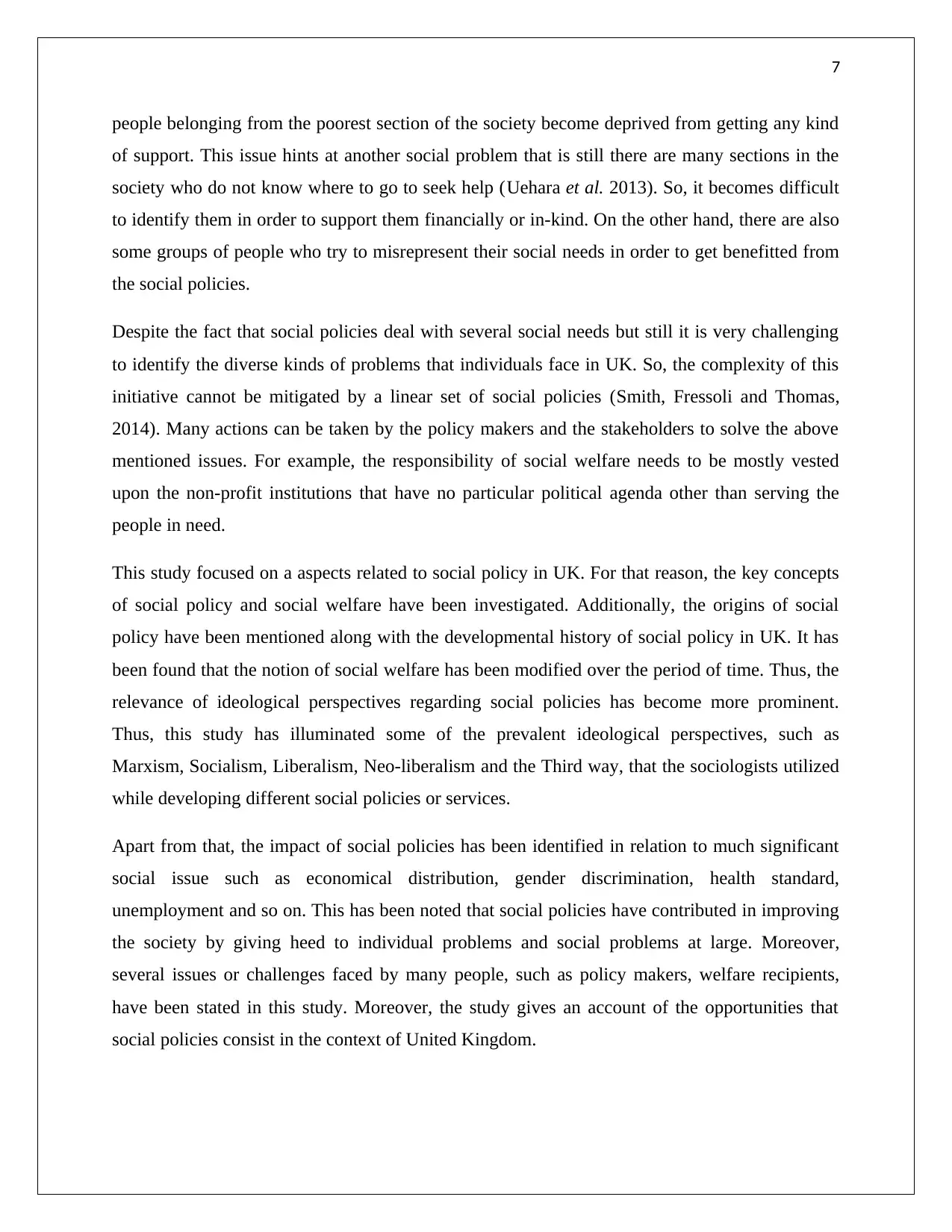
7
people belonging from the poorest section of the society become deprived from getting any kind
of support. This issue hints at another social problem that is still there are many sections in the
society who do not know where to go to seek help (Uehara et al. 2013). So, it becomes difficult
to identify them in order to support them financially or in-kind. On the other hand, there are also
some groups of people who try to misrepresent their social needs in order to get benefitted from
the social policies.
Despite the fact that social policies deal with several social needs but still it is very challenging
to identify the diverse kinds of problems that individuals face in UK. So, the complexity of this
initiative cannot be mitigated by a linear set of social policies (Smith, Fressoli and Thomas,
2014). Many actions can be taken by the policy makers and the stakeholders to solve the above
mentioned issues. For example, the responsibility of social welfare needs to be mostly vested
upon the non-profit institutions that have no particular political agenda other than serving the
people in need.
This study focused on a aspects related to social policy in UK. For that reason, the key concepts
of social policy and social welfare have been investigated. Additionally, the origins of social
policy have been mentioned along with the developmental history of social policy in UK. It has
been found that the notion of social welfare has been modified over the period of time. Thus, the
relevance of ideological perspectives regarding social policies has become more prominent.
Thus, this study has illuminated some of the prevalent ideological perspectives, such as
Marxism, Socialism, Liberalism, Neo-liberalism and the Third way, that the sociologists utilized
while developing different social policies or services.
Apart from that, the impact of social policies has been identified in relation to much significant
social issue such as economical distribution, gender discrimination, health standard,
unemployment and so on. This has been noted that social policies have contributed in improving
the society by giving heed to individual problems and social problems at large. Moreover,
several issues or challenges faced by many people, such as policy makers, welfare recipients,
have been stated in this study. Moreover, the study gives an account of the opportunities that
social policies consist in the context of United Kingdom.
people belonging from the poorest section of the society become deprived from getting any kind
of support. This issue hints at another social problem that is still there are many sections in the
society who do not know where to go to seek help (Uehara et al. 2013). So, it becomes difficult
to identify them in order to support them financially or in-kind. On the other hand, there are also
some groups of people who try to misrepresent their social needs in order to get benefitted from
the social policies.
Despite the fact that social policies deal with several social needs but still it is very challenging
to identify the diverse kinds of problems that individuals face in UK. So, the complexity of this
initiative cannot be mitigated by a linear set of social policies (Smith, Fressoli and Thomas,
2014). Many actions can be taken by the policy makers and the stakeholders to solve the above
mentioned issues. For example, the responsibility of social welfare needs to be mostly vested
upon the non-profit institutions that have no particular political agenda other than serving the
people in need.
This study focused on a aspects related to social policy in UK. For that reason, the key concepts
of social policy and social welfare have been investigated. Additionally, the origins of social
policy have been mentioned along with the developmental history of social policy in UK. It has
been found that the notion of social welfare has been modified over the period of time. Thus, the
relevance of ideological perspectives regarding social policies has become more prominent.
Thus, this study has illuminated some of the prevalent ideological perspectives, such as
Marxism, Socialism, Liberalism, Neo-liberalism and the Third way, that the sociologists utilized
while developing different social policies or services.
Apart from that, the impact of social policies has been identified in relation to much significant
social issue such as economical distribution, gender discrimination, health standard,
unemployment and so on. This has been noted that social policies have contributed in improving
the society by giving heed to individual problems and social problems at large. Moreover,
several issues or challenges faced by many people, such as policy makers, welfare recipients,
have been stated in this study. Moreover, the study gives an account of the opportunities that
social policies consist in the context of United Kingdom.
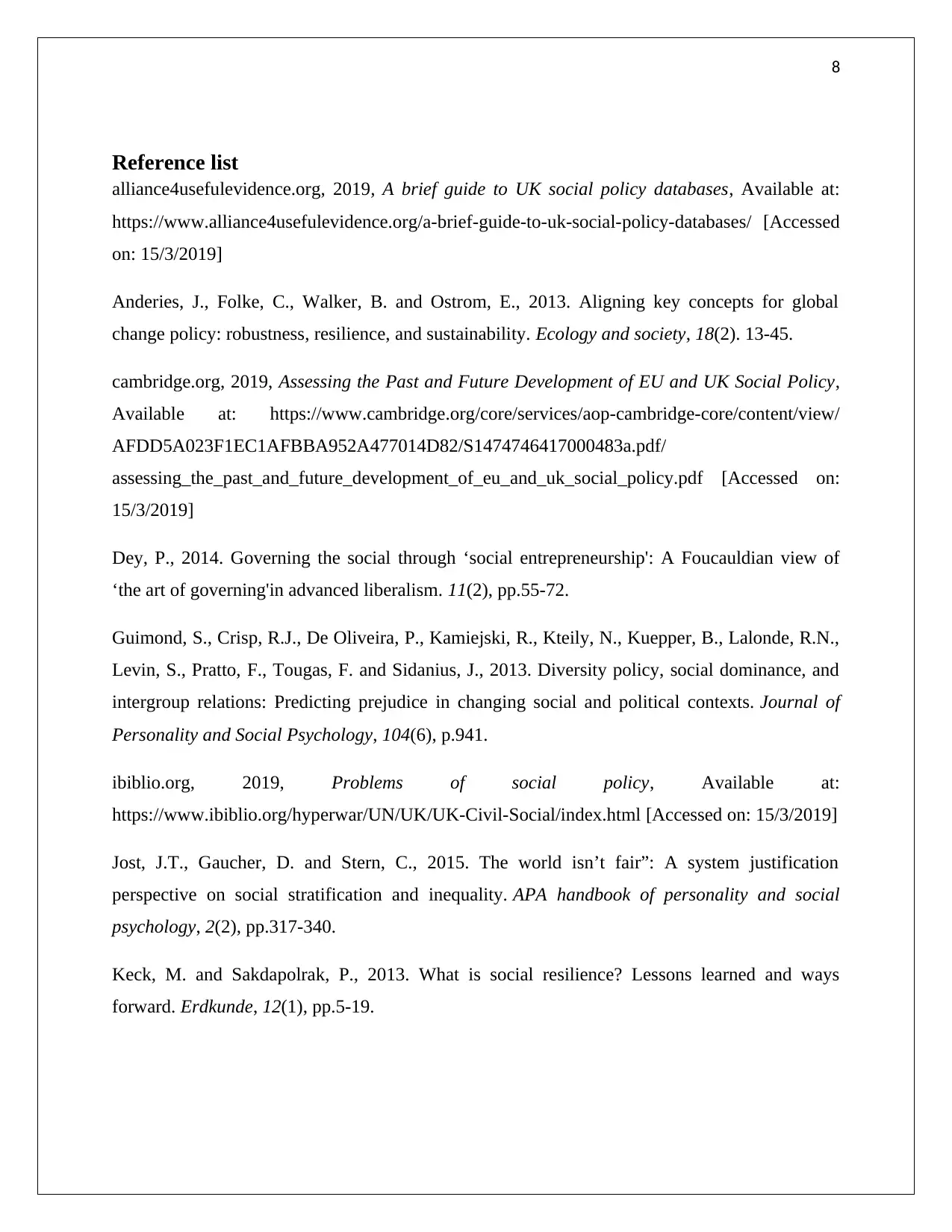
8
Reference list
alliance4usefulevidence.org, 2019, A brief guide to UK social policy databases, Available at:
https://www.alliance4usefulevidence.org/a-brief-guide-to-uk-social-policy-databases/ [Accessed
on: 15/3/2019]
Anderies, J., Folke, C., Walker, B. and Ostrom, E., 2013. Aligning key concepts for global
change policy: robustness, resilience, and sustainability. Ecology and society, 18(2). 13-45.
cambridge.org, 2019, Assessing the Past and Future Development of EU and UK Social Policy,
Available at: https://www.cambridge.org/core/services/aop-cambridge-core/content/view/
AFDD5A023F1EC1AFBBA952A477014D82/S1474746417000483a.pdf/
assessing_the_past_and_future_development_of_eu_and_uk_social_policy.pdf [Accessed on:
15/3/2019]
Dey, P., 2014. Governing the social through ‘social entrepreneurship': A Foucauldian view of
‘the art of governing'in advanced liberalism. 11(2), pp.55-72.
Guimond, S., Crisp, R.J., De Oliveira, P., Kamiejski, R., Kteily, N., Kuepper, B., Lalonde, R.N.,
Levin, S., Pratto, F., Tougas, F. and Sidanius, J., 2013. Diversity policy, social dominance, and
intergroup relations: Predicting prejudice in changing social and political contexts. Journal of
Personality and Social Psychology, 104(6), p.941.
ibiblio.org, 2019, Problems of social policy, Available at:
https://www.ibiblio.org/hyperwar/UN/UK/UK-Civil-Social/index.html [Accessed on: 15/3/2019]
Jost, J.T., Gaucher, D. and Stern, C., 2015. The world isn’t fair”: A system justification
perspective on social stratification and inequality. APA handbook of personality and social
psychology, 2(2), pp.317-340.
Keck, M. and Sakdapolrak, P., 2013. What is social resilience? Lessons learned and ways
forward. Erdkunde, 12(1), pp.5-19.
Reference list
alliance4usefulevidence.org, 2019, A brief guide to UK social policy databases, Available at:
https://www.alliance4usefulevidence.org/a-brief-guide-to-uk-social-policy-databases/ [Accessed
on: 15/3/2019]
Anderies, J., Folke, C., Walker, B. and Ostrom, E., 2013. Aligning key concepts for global
change policy: robustness, resilience, and sustainability. Ecology and society, 18(2). 13-45.
cambridge.org, 2019, Assessing the Past and Future Development of EU and UK Social Policy,
Available at: https://www.cambridge.org/core/services/aop-cambridge-core/content/view/
AFDD5A023F1EC1AFBBA952A477014D82/S1474746417000483a.pdf/
assessing_the_past_and_future_development_of_eu_and_uk_social_policy.pdf [Accessed on:
15/3/2019]
Dey, P., 2014. Governing the social through ‘social entrepreneurship': A Foucauldian view of
‘the art of governing'in advanced liberalism. 11(2), pp.55-72.
Guimond, S., Crisp, R.J., De Oliveira, P., Kamiejski, R., Kteily, N., Kuepper, B., Lalonde, R.N.,
Levin, S., Pratto, F., Tougas, F. and Sidanius, J., 2013. Diversity policy, social dominance, and
intergroup relations: Predicting prejudice in changing social and political contexts. Journal of
Personality and Social Psychology, 104(6), p.941.
ibiblio.org, 2019, Problems of social policy, Available at:
https://www.ibiblio.org/hyperwar/UN/UK/UK-Civil-Social/index.html [Accessed on: 15/3/2019]
Jost, J.T., Gaucher, D. and Stern, C., 2015. The world isn’t fair”: A system justification
perspective on social stratification and inequality. APA handbook of personality and social
psychology, 2(2), pp.317-340.
Keck, M. and Sakdapolrak, P., 2013. What is social resilience? Lessons learned and ways
forward. Erdkunde, 12(1), pp.5-19.
⊘ This is a preview!⊘
Do you want full access?
Subscribe today to unlock all pages.

Trusted by 1+ million students worldwide
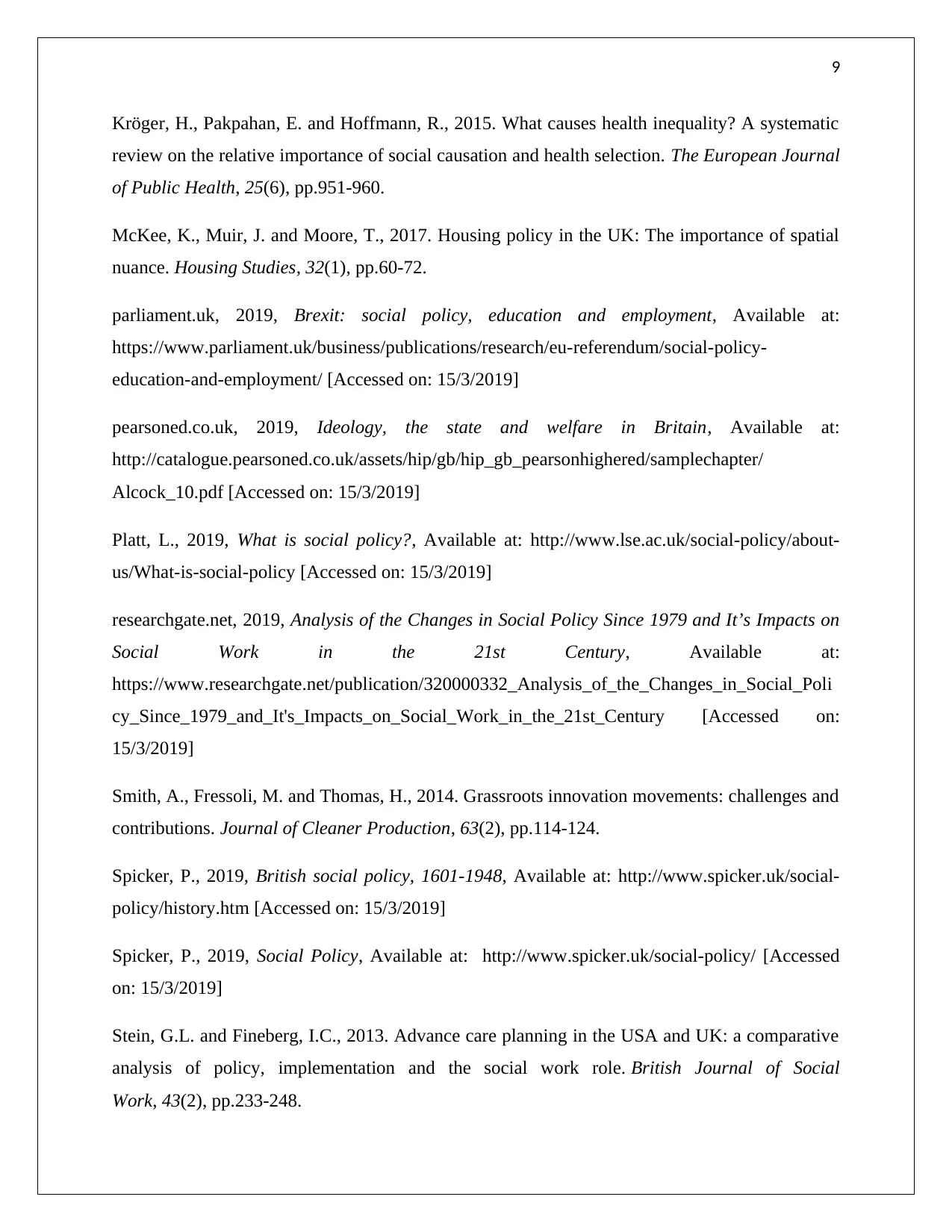
9
Kröger, H., Pakpahan, E. and Hoffmann, R., 2015. What causes health inequality? A systematic
review on the relative importance of social causation and health selection. The European Journal
of Public Health, 25(6), pp.951-960.
McKee, K., Muir, J. and Moore, T., 2017. Housing policy in the UK: The importance of spatial
nuance. Housing Studies, 32(1), pp.60-72.
parliament.uk, 2019, Brexit: social policy, education and employment, Available at:
https://www.parliament.uk/business/publications/research/eu-referendum/social-policy-
education-and-employment/ [Accessed on: 15/3/2019]
pearsoned.co.uk, 2019, Ideology, the state and welfare in Britain, Available at:
http://catalogue.pearsoned.co.uk/assets/hip/gb/hip_gb_pearsonhighered/samplechapter/
Alcock_10.pdf [Accessed on: 15/3/2019]
Platt, L., 2019, What is social policy?, Available at: http://www.lse.ac.uk/social-policy/about-
us/What-is-social-policy [Accessed on: 15/3/2019]
researchgate.net, 2019, Analysis of the Changes in Social Policy Since 1979 and It’s Impacts on
Social Work in the 21st Century, Available at:
https://www.researchgate.net/publication/320000332_Analysis_of_the_Changes_in_Social_Poli
cy_Since_1979_and_It's_Impacts_on_Social_Work_in_the_21st_Century [Accessed on:
15/3/2019]
Smith, A., Fressoli, M. and Thomas, H., 2014. Grassroots innovation movements: challenges and
contributions. Journal of Cleaner Production, 63(2), pp.114-124.
Spicker, P., 2019, British social policy, 1601-1948, Available at: http://www.spicker.uk/social-
policy/history.htm [Accessed on: 15/3/2019]
Spicker, P., 2019, Social Policy, Available at: http://www.spicker.uk/social-policy/ [Accessed
on: 15/3/2019]
Stein, G.L. and Fineberg, I.C., 2013. Advance care planning in the USA and UK: a comparative
analysis of policy, implementation and the social work role. British Journal of Social
Work, 43(2), pp.233-248.
Kröger, H., Pakpahan, E. and Hoffmann, R., 2015. What causes health inequality? A systematic
review on the relative importance of social causation and health selection. The European Journal
of Public Health, 25(6), pp.951-960.
McKee, K., Muir, J. and Moore, T., 2017. Housing policy in the UK: The importance of spatial
nuance. Housing Studies, 32(1), pp.60-72.
parliament.uk, 2019, Brexit: social policy, education and employment, Available at:
https://www.parliament.uk/business/publications/research/eu-referendum/social-policy-
education-and-employment/ [Accessed on: 15/3/2019]
pearsoned.co.uk, 2019, Ideology, the state and welfare in Britain, Available at:
http://catalogue.pearsoned.co.uk/assets/hip/gb/hip_gb_pearsonhighered/samplechapter/
Alcock_10.pdf [Accessed on: 15/3/2019]
Platt, L., 2019, What is social policy?, Available at: http://www.lse.ac.uk/social-policy/about-
us/What-is-social-policy [Accessed on: 15/3/2019]
researchgate.net, 2019, Analysis of the Changes in Social Policy Since 1979 and It’s Impacts on
Social Work in the 21st Century, Available at:
https://www.researchgate.net/publication/320000332_Analysis_of_the_Changes_in_Social_Poli
cy_Since_1979_and_It's_Impacts_on_Social_Work_in_the_21st_Century [Accessed on:
15/3/2019]
Smith, A., Fressoli, M. and Thomas, H., 2014. Grassroots innovation movements: challenges and
contributions. Journal of Cleaner Production, 63(2), pp.114-124.
Spicker, P., 2019, British social policy, 1601-1948, Available at: http://www.spicker.uk/social-
policy/history.htm [Accessed on: 15/3/2019]
Spicker, P., 2019, Social Policy, Available at: http://www.spicker.uk/social-policy/ [Accessed
on: 15/3/2019]
Stein, G.L. and Fineberg, I.C., 2013. Advance care planning in the USA and UK: a comparative
analysis of policy, implementation and the social work role. British Journal of Social
Work, 43(2), pp.233-248.
Paraphrase This Document
Need a fresh take? Get an instant paraphrase of this document with our AI Paraphraser
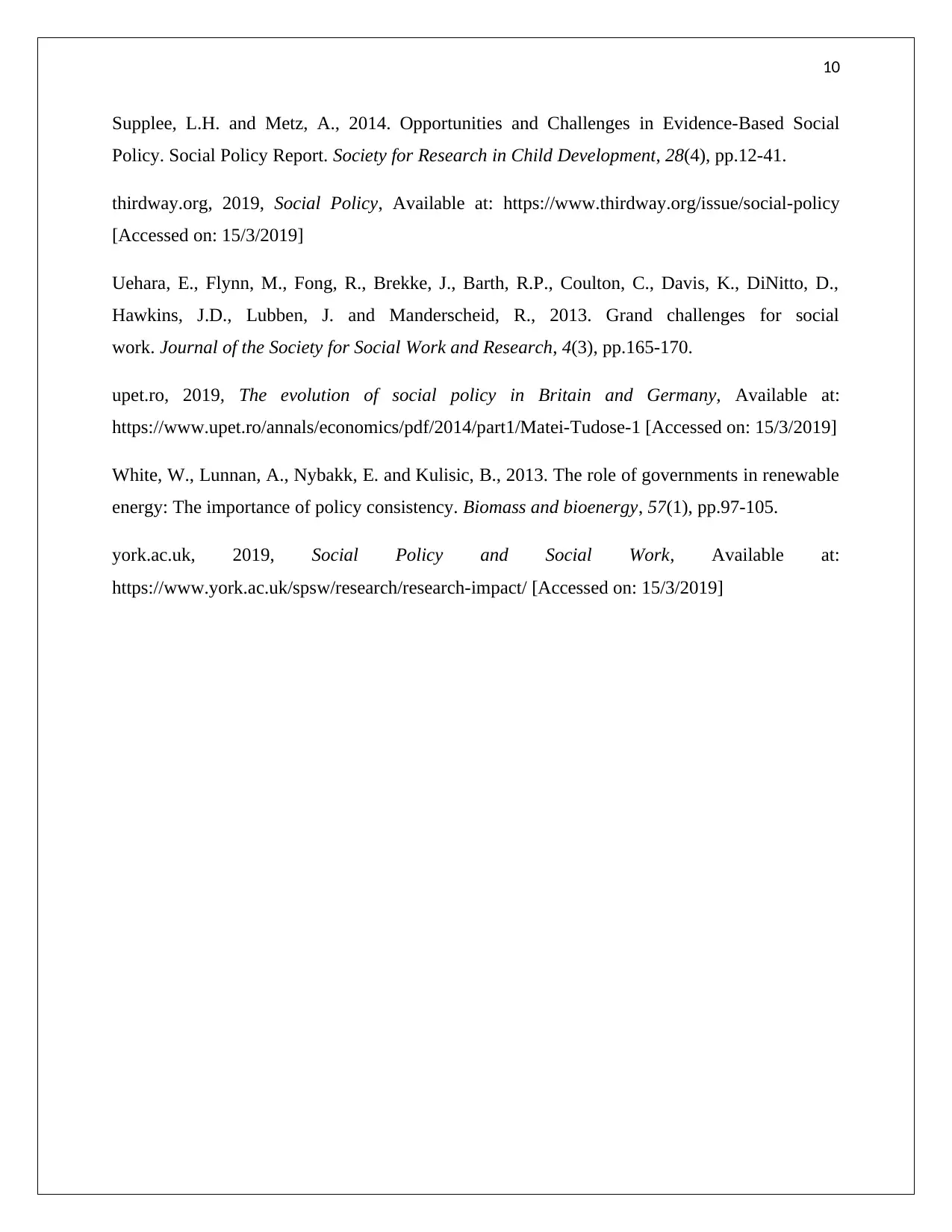
10
Supplee, L.H. and Metz, A., 2014. Opportunities and Challenges in Evidence-Based Social
Policy. Social Policy Report. Society for Research in Child Development, 28(4), pp.12-41.
thirdway.org, 2019, Social Policy, Available at: https://www.thirdway.org/issue/social-policy
[Accessed on: 15/3/2019]
Uehara, E., Flynn, M., Fong, R., Brekke, J., Barth, R.P., Coulton, C., Davis, K., DiNitto, D.,
Hawkins, J.D., Lubben, J. and Manderscheid, R., 2013. Grand challenges for social
work. Journal of the Society for Social Work and Research, 4(3), pp.165-170.
upet.ro, 2019, The evolution of social policy in Britain and Germany, Available at:
https://www.upet.ro/annals/economics/pdf/2014/part1/Matei-Tudose-1 [Accessed on: 15/3/2019]
White, W., Lunnan, A., Nybakk, E. and Kulisic, B., 2013. The role of governments in renewable
energy: The importance of policy consistency. Biomass and bioenergy, 57(1), pp.97-105.
york.ac.uk, 2019, Social Policy and Social Work, Available at:
https://www.york.ac.uk/spsw/research/research-impact/ [Accessed on: 15/3/2019]
Supplee, L.H. and Metz, A., 2014. Opportunities and Challenges in Evidence-Based Social
Policy. Social Policy Report. Society for Research in Child Development, 28(4), pp.12-41.
thirdway.org, 2019, Social Policy, Available at: https://www.thirdway.org/issue/social-policy
[Accessed on: 15/3/2019]
Uehara, E., Flynn, M., Fong, R., Brekke, J., Barth, R.P., Coulton, C., Davis, K., DiNitto, D.,
Hawkins, J.D., Lubben, J. and Manderscheid, R., 2013. Grand challenges for social
work. Journal of the Society for Social Work and Research, 4(3), pp.165-170.
upet.ro, 2019, The evolution of social policy in Britain and Germany, Available at:
https://www.upet.ro/annals/economics/pdf/2014/part1/Matei-Tudose-1 [Accessed on: 15/3/2019]
White, W., Lunnan, A., Nybakk, E. and Kulisic, B., 2013. The role of governments in renewable
energy: The importance of policy consistency. Biomass and bioenergy, 57(1), pp.97-105.
york.ac.uk, 2019, Social Policy and Social Work, Available at:
https://www.york.ac.uk/spsw/research/research-impact/ [Accessed on: 15/3/2019]
1 out of 11
Related Documents
Your All-in-One AI-Powered Toolkit for Academic Success.
+13062052269
info@desklib.com
Available 24*7 on WhatsApp / Email
![[object Object]](/_next/static/media/star-bottom.7253800d.svg)
Unlock your academic potential
Copyright © 2020–2026 A2Z Services. All Rights Reserved. Developed and managed by ZUCOL.





